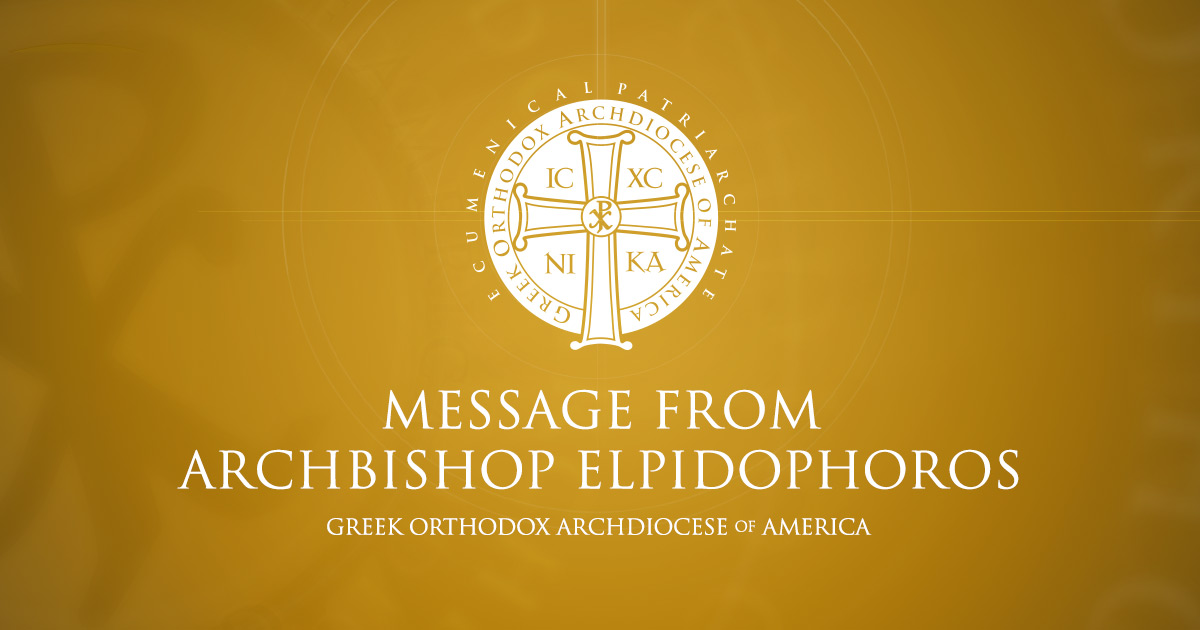His Eminence Archbishop Elpidophoros
Closing Remarks at the Presentation:
POLIS: The Queen of Cities
A Musical Tribute to the Fall of Constantinople
May 10, 2024
Saint Sophia Greek Orthodox Cathedral
Washington, DC
My Dear Friends:
Χριστὸς Ἀνέστη! Christ is Risen! Χριστὸς Ἀνέστη!
I am so very pleased to be with you this evening – here in the joyous and beautiful Bright Week, to share in this amazing musical program that speaks across the centuries about the Queen of Cities, our beloved and precious Constantinople.
I want to thank the Saint Sophia Cathedral Community, the local AHEPA Chapter Number 31 – which celebrates its one hundredth anniversary of its charter this year – and of course, the artists of the Byzantine Choir of the Greek Orthodox Archdiocese of America, the Politiko Instrumental Ensemble, and the Saint Sophia Byzantine Choir – all under the expert direction of the Maestro, Archon Mousikodidaskalos Georgios Theodoridis.
The program was truly inspiring and executed with the highest artistic standards. Everyone is to be congratulated for their extraordinary efforts to bring these musical memories and traditions to the foreground of our attention, where they belong.
I am also particularly moved by this event, because of its synchronicity with the date of the founding of New Rome, which is also, auspiciously so, the same date as my election to be Archbishop of America, tomorrow on May Eleventh. For the good wishes and acclamations of “Many Years” that I have received, I express to all of you my profound thanks.
But I am also feeling the varied emotions that I believe many of you are feeling, because of the formal re-conversion of the Chora Monastery into a djami earlier this week, so that it now has the same status as Agia Sophia. The utter lack of any sense of religious and cultural pluralism that surrounds this unfortunate development betrays insecurity, and a false and hollow triumphalism which impedes the realistic advancement of Turkish society. One can never embrace a positive future if you mask your past – whether its glories or its disgraces.
I look up into the dome and the walls of this magnificent cathedral, and I behold the legacy of Byzantium in all its glory. And this is a living legacy, infused by the Spirit of God and in constant emergence within our Church.
Indeed, although the title for this evening is a “Musical Tribute to the Fall of Constantinople,” and we have heard truly resplendent melodious laments, we are gathered to not merely remember the Ἅλωσις of the Queen of Cities. Ἅλωσις means “conquest by an enemy,” but we translate by the term, “Fall,” because it implies the moment in time – Tuesday, May 29, 1453 – when the City was overwhelmed by invaders. But it would be inaccurate for us to conceive of the “Fall of Constantinople” as the end or termination of our Orthodox Christian Civilization, even if our monuments are still being seized for alien purposes.
As Christians, we are the People of the Resurrection, and we fully understand that the only way to the Empty Tomb is through the Crucifixion. That being said, our spiritual tradition, which reached an aesthetic and liturgical apex during the Byzantine era, is alive and well – as witnessed by this evening’s performance in this wondrous Cathedral.
Therefore, I would say that in truth, although we mark the date of May 29, 1453 as a turning point of history; it is still May 11, 330 that retains its power for us – because the essential tradition of the Queen of Cities lives on.
It lives on in our Most Holy Mother Church of Constantinople.
It lives on in the sacred person of our Ecumenical Patriarch, His All-Holiness Bartholomew.
It lives on in our Sacred Archdiocese and all of our spiritual institutions.
And it lives on in this Cathedral and in all our parishes, in the lives of the faithful clergy and laity who preserve in their minds, hearts, and souls the inheritance of Byzantium.
We are, my beloved Christians, as His All-Holiness has said, the “children of memory.” [*] We are those called to weave our lives into the rich tapestry of our Orthodox Christian Faith, and so become both the carriers and the messengers of this greatest and most ancient spiritual tradition, whose source is none other than the Lord Jesus Christ Himself!
Tonight’s music and song reminds all of us of this great gift and responsibility – not only to ourselves and to those who came before us – but to our children and our children’s children.
As Orthodox Christians, we know what it is to be crucified with Christ. But we also live in the eager expectation of the Resurrection, by whose power our Faith will never diminish. We go on in the faith of the Conqueror of Death.
And so, I leave you with the one message that exceeds all others: Χριστὸς Ἀνέστη!
[*] “Mnemosyne and the Children of Memory,” Address at the British Museum, November 12, 1993.

